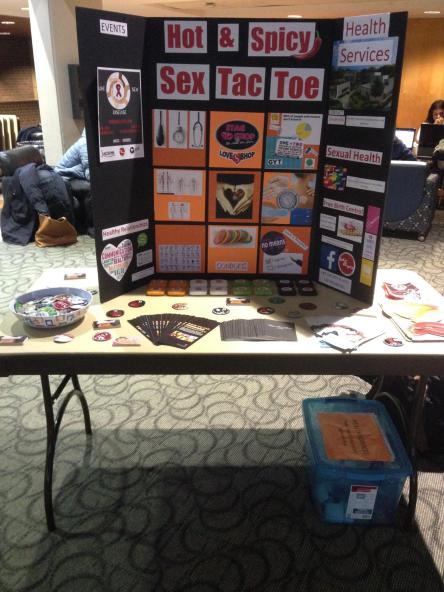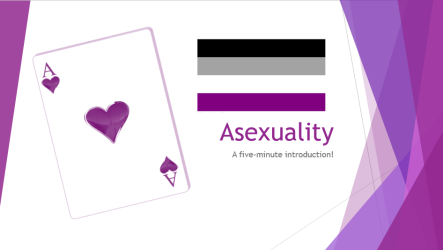I don’t think that I’m the type of person who comes to mind when someone says “sex educator.” I certainly never thought I would be one, because although I’m sex-positive and believe in education, I’m pretty reserved and it used to be the kind of topic I didn’t even discuss with my friends.
Of course, now I’m minoring in human sexuality and looking to study intimate relationships when I get to grad school, so clearly something has changed in the last few years.

One of the booths that I host at my school (and that I helped design!)
It was my first year at university, and the residences had organized an event where one of the school’s health education teams would deliver a seminar about sexuality for our entire building. A few of my friends decided to go “to laugh and eat free snacks.” I joined them and acted bashful about the whole thing, although secretly I was pretty curious about what they would talk about. Would I learn anything new?
In terms of sex, I did not. Aside from a couple of well-intentioned but misguided messages, the sex education I received in public school was comprehensive, inclusive, and factual. In middle school, we discussed things like drinking, drugs, and consent. In high school gym class, we studied the various sexually transmitted infections and forms of birth control outside of condoms and the pill. (We even acted out a play, as a class, that depicted the journey of a sperm cell to an egg. Each of us played a different part of the male or female reproductive system. It was embarrassing, but it was thorough.) Frankly, nothing the seminar presented was a revelation to me.
What I did learn was that what I assumed to be common knowledge actually was quite exclusive. For the other people in the room, a lot of this information was completely foreign. Some of them had never put a condom on a banana – or even seen a condom to begin with – because they came from places with insufficient sex ed. And when the seminar presented things in a way that was shaming, ambiguous, or totally inaccurate, I looked around the room to see if anyone else had noticed. It seemed like no one had.
I wanted to raise my hand and ask why they used gendered language and stereotypes to send their message (“Guys, you’re going to have your hands down your pants at night anyway, so you may as well check for testicular cancer while you’re at it!”). Why had they ignored the fact that condoms come in different shapes and sizes, and that just because a given size fits on an arm or a leg, does not mean it is comfortable? What if someone didn’t know what the slang terms they were using meant? Why were we racing to put on a condom the fastest when in reality, it’s more important to slow down and follow the steps accurately?
Unfortunately, I was too afraid that I would be seen as a troublemaker or nuisance rather than someone with good intentions. As timid as I was, I also didn’t want random strangers to see me as that girl who knew way too much about sex. I didn’t even slip my concerns into the anonymous question box for fear of being roasted by the presenters. I understood that the people presenting were students and they wanted to engage with their audience as peers. Despite that, I couldn’t help thinking that the over-the-top jokes about masturbation and casual dismissal of certain topics would sit poorly with people, like myself, who were less comfortable with talking about sex. Didn’t everyone need this information? Shouldn’t it appeal to all audiences?
That night, I was uncharacteristically fervent about correcting the myths my friends seemed to believe. Even though I had always been pretty reserved on the topic, talking to them made me feel more confident about my relative level of knowledge. I decided that if I could not express my doubts as an audience member, I would try to join the team and influence the seminar’s content from within. I applied on their website, but was rejected.
A year later, however, I enrolled in Introduction to Human Sexuality – a full course dedicated to the study of sex. Even in this course, I was astonished by how much of the early portion of the syllabus was dedicated to things I’d learned in grade 5, and the professor specifically explained that it was because she couldn’t assume people had received even rudimentary sex ed when they were in high school. I did end up learning a lot in that class, but I was growing even more concerned about the vast gaps in sexual education. The vocal opposition to Ontario’s revised sex ed curriculum, introduced around the same period, only furthered my worries.
By chance, I met the new team leader for the sexual health education team at an unrelated event that year. I told her that though I’d been rejected I still thought the fact that we had a sexual health team in the first place was incredibly important. She informed me that they had actually revised their messaging to be more inclusive, and she encouraged me to apply once again for the upcoming year. This time, I was accepted onto the team and with that, my real foray into sex ed began.
In my time as a peer health educator, I’ve delivered tons of seminars. I’ve also been involved in planning events and sharing fun, educational content on our social media. We’ve had the opportunity to collaborate with local groups like the Sexual Health, Options, Resources, and Education (SHORE) Centre and AIDS Committee of Cambridge, Kitchener, Waterloo, and Area (ACCKWA). I have a lot more confidence speaking to people about strange topics (mainly built by having to shout, “free condoms!” in crowded public places).
I still think it’s important to connect with students through humour, but I try to infuse the jokes with sex positivity and maturity. I want to reach as many people as I can, and that means balancing laughs with up-to-date information, precise language, compassionate explanations, and a positive, curiosity-provoking attitude towards sexuality. I think about people, like myself, who were reserved when it came to discussions of sex and who were turned off (ha) by the crude way sex is often portrayed or joked about. Normalizing sex sometimes means talking about it the same way you might talk about the importance of exercise or dental hygiene – in other words, framing it as a crucial health issue that affects everyone.

At our team meetings, we do “Snacks and Slideshow,” a weekly presentation by a team member on any sexuality topic of their choice. The first one I did was about asexuality!
These days, one thing that our team does differently is collecting feedback after each seminar. The comments are often split between “I didn’t learn anything new,” and “Wow, this was really informative!” The gap is still there, but I think it is narrowing slowly.
More importantly, I know that we are starting meaningful conversations between students. After they visit our booth or attend a seminar, I overhear students talking about things like consent between spouses, sex toys, and the importance of lubrication. It’s funny because the most passionate discussions seem to be between people who first approach us in a flippant way: They would say things like “I’m grabbing this gigantic stack of condoms for a friend” or laugh when someone said the word “penis,” and leave debating much more serious topics with their friends.
Making sure that everyone is informed of the basics has become a personal and professional mission of mine. Even if it’s just one or two people that I reach at a time, it makes a difference. We live in a world where more and more people speak up for gender-neutral bathrooms, better treatment of sexual assault survivors, and increased access to valuable sexual health services. If we give everyone a common, evidence-based starting point, then we can have the necessary, productive discussions that allow these changes to happen.








